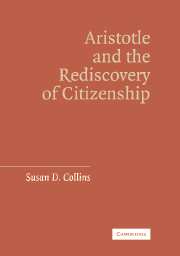Book contents
- Frontmatter
- Contents
- Acknowledgments
- Aristotle and the Rediscovery of Citizenship
- Introduction: The Rediscovery of Citizenship
- 1 Liberal Citizenship and Aristotle's Ethics
- 2 Citizen Virtue and the Longing for the Noble
- 3 Justice as a Virtue
- 4 Prudence, the Good Citizen, and the Good Life
- 5 Citizenship and the Limits of Law
- 6 Political Wit and Enlightenment
- Conclusion: Aristotle and the Rediscovery of Citizenship
- Bibliography
- Index
2 - Citizen Virtue and the Longing for the Noble
Published online by Cambridge University Press: 17 July 2009
- Frontmatter
- Contents
- Acknowledgments
- Aristotle and the Rediscovery of Citizenship
- Introduction: The Rediscovery of Citizenship
- 1 Liberal Citizenship and Aristotle's Ethics
- 2 Citizen Virtue and the Longing for the Noble
- 3 Justice as a Virtue
- 4 Prudence, the Good Citizen, and the Good Life
- 5 Citizenship and the Limits of Law
- 6 Political Wit and Enlightenment
- Conclusion: Aristotle and the Rediscovery of Citizenship
- Bibliography
- Index
Summary
Understanding the complexity of moral virtue and the perspective that informs it requires attention to the substance and order of Aristotle's discussion of the particular virtues in the Nicomachean Ethics. It is necessary, before turning to this discussion, to address a couple of objections to this claim, objections represented by the strong statement of Sir David Ross and largely responsible for a general neglect of the virtues:
This part of the Ethics presents a lively and often amusing account of the qualities admired or disliked by cultivated Greeks of Aristotle's time … no attempt is made at an exhaustive logical division of either feelings or actions. The order is haphazard; two of the cardinal virtues are treated first and in considerable detail (the other two being reserved for treatment in Books V and VI); the other virtues are taken up just as they occur to Aristotle's mind, one no doubt suggesting another as he proceeds.
Such a view would supply a good reason for the neglect of the particular virtues, and while students of Aristotle rarely subscribe to the whole of Ross's view, many assume the validity of some part of it. The full case against this position requires the substantive examination of the virtues (cf. NE 1107b14–16, 20–1, 1108a1–2), yet it is possible to address the main propositions in a prefatory way by speaking first to the question of the organization and order of the list and then to the connection of the virtues to Greek convention.
- Type
- Chapter
- Information
- Aristotle and the Rediscovery of Citizenship , pp. 47 - 66Publisher: Cambridge University PressPrint publication year: 2006



